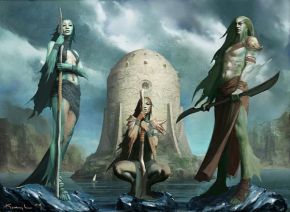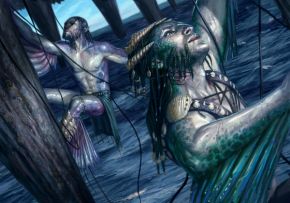Difference between revisions of "Mero"
| Line 1: | Line 1: | ||
{{FirstLightRace | {{FirstLightRace | ||
| − | |RaceName= | + | |RaceName=Mero |
|Image=[[Image:Mero_01.jpg|right|290px]]<br>[[Image:Mero_02.jpg|right|290px]] | |Image=[[Image:Mero_01.jpg|right|290px]]<br>[[Image:Mero_02.jpg|right|290px]] | ||
|AbilityScores=Your Charisma score increases by 2, and your Dexterity score increases by 1. | |AbilityScores=Your Charisma score increases by 2, and your Dexterity score increases by 1. | ||
Revision as of 13:37, 16 September 2015
Mero
|
Ability Scores
|
| Your Charisma score increases by 2, and your Dexterity score increases by 1. |
Basic Traits
|
| • Age: The mero have an average lifespan. They mature after about 40 seasons and can easily live 250 to 300 seasons. • Size: Medium • Speed: 30 feet, swim speed 30 feet |
Other Traits
|
| •Aquatic: You can breathe underwater. In addition, you have a swim speed of 30 feet. •Waterborn Physique: You have proficiency in athletics. •Easy Virtuoso: You have proficiency with one musical instrument. •Song of Allure or Alarm: You may use your voice to fortify others, granting them 1d6 temporary hit points. This increases to 2d6 at 6th level, 3d6 at 11th level, 4d6 at 16th level. Alternately, you may raise your voice to harm others in a 15 foot cone. Each creature caught in your song must make a Constitution save. The DC for this save equals 8 + your Charisma modifier + your proficiency bonus. A creature takes 2d6 sonic damage on a failed save, and half as much damage on a successful one. The damage increases to 3d6 at 6th level, 4d6 at 11th level, and 5d6 at 16th level. |
The unfettered mero are nearly as old as the erephim. They awakened with the first river and found comfort in its shallows. Though they learned agriculture from the erephim, they prefer to flow with their rivers. They are cyclic nomads, maintaining loose camps called harborages to which tribes of mero come and go. Often a harborage is surrounded by lightly cultivated stretches of both land and water crops and its waters stocked with fish. Most harborages have at least one resident spirit who can advise which chores need tending when a new tribe arrives. Although the other races mistake the mero's wanderings as random, the folk adhere to a complicated but flexible pattern of migration that allows them to anticipate when any given harborage will be free for their use.
The mero love story and song and are renowned for their beguiling voices. Riverlands populated by the mero ring with near constant song. Celebration comes easily to them, the slightest event inspiring them to rise in joy. Other races sometimes find the mero frivolous for such behavior, as extended stays in their presence seem little more than an unending festival. In truth, the mero attend their daily routines through such celebration, which helps them maintain their focus for long periods of time.
Though the mero can breathe underwater, they are more comfortable on the shores and shallows, entering the deep mostly for play and food. They need not stay near water, and their wandering regularly takes them away from it. A return to the riverbank is always cause for a grand festival, though.
The mero are a willowy, lithe folk. Their skin is covered with tiny, metallic scales and often speckled with rosettes of algae that glow faintly in the dark. Their hair is commonly flowing and long in the greens and browns of water plants. Short fins line the back of their arms and legs, and some have whisker-like spines that sprout above their lips.

